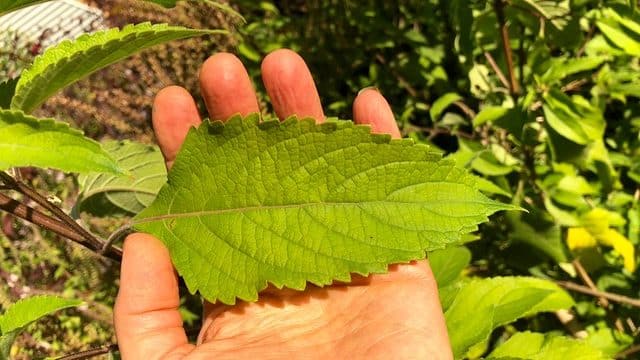The 3 reasons I grow Tulsi are for health, for habitat and for its hardiness.
I grow many types of hardy perennial basil. This particular basil (above) has the furry leaves and clove flavour is called Vana Tulsi (Ocimum gratissimum) but also known as East Indian Tree Basil, Clove Basil, African basil.
It is one of the four main forms of Tulsi recognised and cultivated for medicinal purposes and as part of Indian spiritual traditions.
Let me explain my 3 reasons I grow Tulis – sacred basil – in a little more depth.
Health
Tea:
Tulsi is used for general well-being, as an anti-oxidant, to help overcome colds and coughs. It makes a great infusion – just a couple of leaves in a cup of hot water, or I often mix it with other leaves, flowers, fruits and roots such as lemon myrtle, rosella, ginger, turmeric and lime. The tea is often used to relieve stress.
Here is a link to a previous post about making a special brew for a colds directly from the garden.
Flavour:
The strong clove scent and spicy flavour of the leaves are great to add to curries. I usually leave it till toward the end before I add the leaves to retain most of the flavour and nutrient value. The leaves are best freshly picked from the bush , but it is also possible to dry or freeze them for later use.
Skin:
Rubbing Tulsi (holy basil) leaf on the skin help can with bites, skin infections and prevent acne. The rubbing releases the essential oils in the leaves, the main aromatic oil found in Tulsi is Eugenol which is considered very important in ayurveda. Because of they exude Eugenol, Vana tulsi repel insects and mosquitoes
In India, this plant is revered as a purifier of the mind, body, and spirit.
Habitat
Bees love Vana tulsi and little insectiverous birds use this as a hideout as they dart around the garden picking of garden ‘pests’. It is a woody shrub that can grow up to 2 metres and it flowers prolifically.
This is a short clip I made about using another type of Tulsi in my garden.
Hardiness
Vana tulsi is a hardy perennial in warmer climates that is easy to strike by cuttings. In temperate areas it can be grown as an annual as it is frost sensitive. It does well in quite poor soil, in dry conditions and pots. It thrives in a nice sunny spot.
So there you have it, the 3 reasons I grow Tulsi – for good health, for ecological habitat and for simple hardy abundance.


